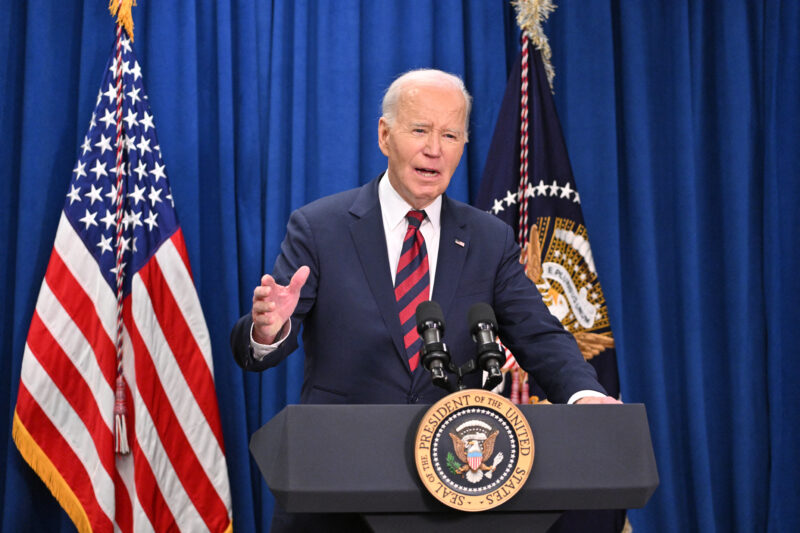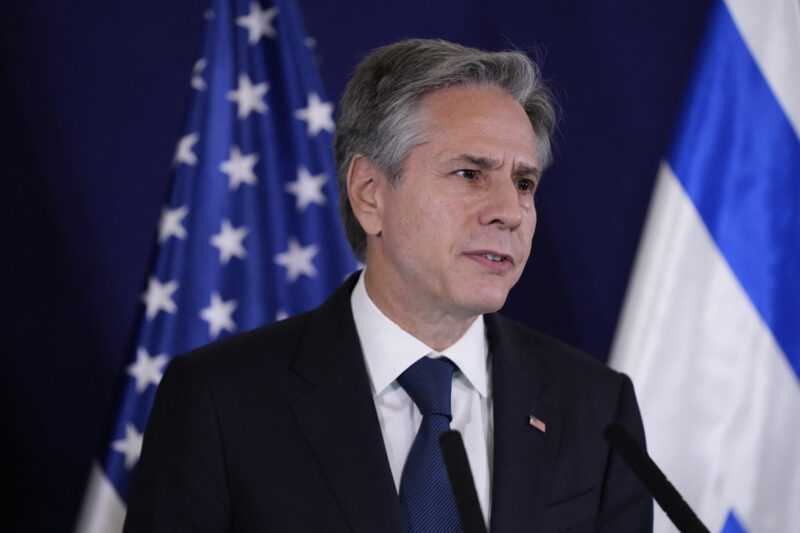Daily Kickoff
👋 Good Wednesday morning!
Deborah Lipstadt’s nomination to be the State Department’s special envoy to monitor and combat antisemitism passed out of the Senate Foreign Relations Committee yesterday after weeks of delays. More below.
The Republican Jewish Coalition’s PAC endorsed Jennifer Strahan, a Republican challenging Rep. Marjorie Taylor Greene (R-GA) in Georgia’s 14th Congressional District. We’ve got the scoop below.
Five people were killed yesterday after a shooting rampage by a Palestinian man in Bnai Brak outside Tel Aviv. Among those killed were two Israeli civilians and an Israeli-Arab police officer.
The assailant, who lived in the West Bank, had previously served time in prison for membership in a terror group. He was killed by police fire after the attack.
Yesterday’s attack marks the fifth terror attack in Israel in two weeks, in which 11 people have been killed, stoking tensions ahead of what was already expected to be a tense several weeks amid the rare confluence of the Passover holiday, Ramadan and Easter.
Israeli Prime Minister Naftali Bennett said the country “is facing a wave of murderous Arab terrorism.” U.S. Ambassador to Israel Tom Nides tweeted that his “heart goes out to the families of the victims. No one should have to endure such heartbreak.”
The attack was condemned by Palestinian Authority President Mahmoud Abbas, who met with Secretary of State Tony Blinken over the weekend. “The killing of Palestinian and Israeli civilians will only lead to a deterioration of the situation at a time when we are trying to reach a stabilization on the eve of the month of Ramadan,” Abbas said in a statement.
Knesset Speaker Mickey Levy, who had been in the U.S. for meetings with U.S. officials, lawmakers and Jewish community leaders, cut short the trip and is heading back to Israel.
In a statement last night, Blinken said, “We strongly condemn today’s terrorist attack in Bnei Brak, Israel, that killed five innocent victims. This comes after two other recent horrific terrorist attacks in Hadera and Be’er Sheva, Israel. This violence is unacceptable. Israelis — like all people around the world — should be able to live in peace and without fear. Our hearts go out to the families of those killed in the attacks. May their memories be a blessing.”
polling place
Shift in early primary states could amplify ‘Jewish voice’ in electoral process

Democratic presidential candidate and South Bend, Indiana, Mayor Pete Buttigieg (L) gets a little grilling guidance from Iowa Pork Queen Gracie Greiner, 18, of Washington, Iowa, at the Iowa Pork Producers Association’s Tent during the Iowa State Fair August 13, 2019, in Des Moines, Iowa.
American Jews have long turned out to vote in large numbers, but their influence has been limited in presidential primaries. The states that vote first — Iowa, New Hampshire, South Carolina and Nevada — are not among the largest Jewish communities in the nation. Iowa is one of the smallest. But more Jewish voters could have a say if the Democratic National Committee adopts a proposal that would radically alter the presidential primary schedule, Jewish Insider’s Gabby Deutch reports.
Jewish voice: “It would be nice to have the Jewish voice reflected in the early primaries,” said Jill Zipin, the co-founder of a group called Democratic Jewish Outreach Pennsylvania. In 2020, Pennsylvania’s primary didn’t take place until June. Sen. Bernie Sanders (I-VT) had already dropped out of the race in early April.
Hawkeye hangover: For years, some Democrats have questioned why Iowa, a conservative and overwhelmingly white state, gets the coveted first slot with its complicated caucus system. Presidential hopefuls spend a disproportionate amount of time barnstorming in Iowa, stopping by the state fair and other mainstays of the Hawkeye State. But while visits to synagogues and meetings with Jewish community members are a regular occurrence in the general election, they are exceedingly rare in the early primary states that set the direction for the party’s nominating process.
Accepting applications: The proposal being considered by the DNC’s Rules and Bylaws Committee would give the earlier primary dates to states that are more racially diverse and competitive in the general election, and it would add a fifth state primary before the crowded “Super Tuesday” in early March. States would have to submit applications to the DNC highlighting their diversity and general election competitiveness to be considered for those spots.
Reflecting diversity: Halie Soifer, CEO of the Jewish Democratic Council of America, praised the proposal, saying it “underscores Democrats’ commitment to strengthening our democracy and ensuring our institutions reflect America’s diversity” and calling it “a welcome step toward ensuring that all Americans feel represented in the electoral process.” About 70% of American Jews identify as Democrats.
N.J. first: One state already jockeying for a spot at the front of the pack is New Jersey. The head of the New Jersey Democratic Party wrote to DNC Chair Jaime Harrison earlier this month asking him to consider the Garden State for one of the early primary dates. “In many ways, we are truly a microcosm of the country,” the letter states. “With all that Jersey has to offer, it would be great to move the Garden State up as an early presidential primary state,” Rep. Josh Gottheimer (D-NJ) told JI.
challenge flag
Republican Jewish Coalition PAC endorses Marjorie Taylor Greene opponent Jennifer Strahan

Rep. Marjorie Taylor Greene (R-GA), Jennifer Strahan
The Republican Jewish Coalition’s political action committee is endorsing Jennifer Strahan, a primary challenger to Rep. Marjorie Taylor Greene (R-GA) in Georgia’s newly drawn 14th Congressional District, Jewish Insider’s Matthew Kassel reports. “If you are a conservative Republican who cares about the issues facing America, if you are a Trump conservative in that district, you will get somebody in Jennifer Strahan who shares those views without all the baggage that comes with Marjorie Taylor Greene,” Matt Brooks, the RJC’s executive director, told JI.
Rare move: The RJC opposed Greene in the 2020 primary and has frequently criticized the freshman congresswoman’s antisemitic remarks and other extremist statements she has made in office. But the group, which does not typically endorse against GOP incumbents, had not indicated until now whether it would back an opposing candidate in the May primary, where three Republicans, including Strahan, are going up against Greene.
‘Shared priorities’: “Their support means a lot to me personally and is a statement about the growing strength of our campaign to return effective representation to Georgia’s 14th district,” Strahan said in a statement to JI. “I look forward to working with the RJC team in Washington to promote our shared priorities of peace through strength and policies that foster economic growth.”
Gaining momentum: Limited publicly available polling suggests that Strahan has a tough task, but the 35-year-old healthcare executive has been gaining momentum in recent weeks. Last week, she notched an endorsement from the Value in Electing Women PAC as well as the Associated General Contractors of America PAC. Brian Turmail, AGC of America’s vice president of public affairs and strategic initiatives, said AGC PAC had donated $5,000 to Strahan’s campaign as of last Wednesday.
Uphill battle: Jake Monssen, a spokesperson for Strahan, said the RJC had also given $5,000 to her campaign. He declined to reveal how much Strahan has raised ahead of the first-quarter filing deadline on April 15, only confirming a “six-figure” fundraising total. Greene, for her part, entered the new year with just over $3.5 million on hand.
in the room
Rubio, Romney vote yes on Lipstadt, all other SFRC Republicans vote no

Deborah Lipstadt, nominee to be special envoy to monitor and combat antisemitism, speaking at a hearing of the Senate Foreign Relations Committee.
The Senate Foreign Relations Committee voted on Tuesday morning to advance the nomination of Deborah Lipstadt, the Biden administration’s pick to be special envoy to monitor and combat antisemitism, to full Senate consideration, with just two Republicans — Sens. Marco Rubio (R-FL) and Mitt Romney (R-UT) — voting in the affirmative, along with every Democrat on the committee, Jewish Insider’s Marc Rod reports. The vote comes exactly eight months after JI first reported that Lipstadt would be nominated.
The opposition: During Tuesday’s meeting, Sen. Ron Johnson (R-WI) reiterated the grievances he expressed at Lipstadt’s confirmation hearing. Lipstadt criticized Johnson on Twitter, which became the source of Republicans’ objections to her nomination. “I thought it was interesting when Majority Leader [Chuck] Schumer [D-NY] introduced her and he was talking about antisemitism and how awful it is in terms of the ‘malicious poison,’” Johnson said. “Well, I would argue that Deborah Lipstadt’s postings on social media represent malicious poison. I think a vote for her basically acknowledges that you’re OK with malicious poison as long as it’s directed at somebody you don’t agree with.”
Switching sides: Sen. Ted Cruz (R-TX) said he initially planned to support Lipstadt, calling her “a serious person and an intelligent person” but said he was “troubled” by the Johnson tweet, arguing that it “undermines the effectiveness of this job.”
In her defense: Sens. Bob Menendez (D-NJ) and Ben Cardin (D-MD) pushed back, pointing to Lipstadt’s subject-area expertise and reputation, and argued that her record on the issue has been nonpartisan. “I can tell you that Deborah Lipstadt is the leader in this country on antisemitism. She has a global reputation,” Cardin said. “Her reputation and credibility within the stakeholders who are fighting antisemitism in the United States and around the world is without question. She is the most qualified individual to be appointed to this position.”
On the floor: Given the strong Republican opposition in the Foreign Relations Committee, Democratic leadership will likely have to hold floor votes on her nomination. But a Senate floor source told JI Tuesday afternoon that Democratic leadership will try to confirm Lipstadt by unanimous consent — a fast-track procedure requiring the approval of every senator — before initiating procedural steps to hold votes on Lipstadt. The source said that Supreme Court nominee Ketanji Brown Jackson’s pending confirmation proceedings next week will eat up floor debate time. Democratic leadership is aiming to confirm Jackson before Easter recess, which runs from April 11-22. The source said Democrats will try to confirm Lipstadt before recess as well, or shortly thereafter.
End of the tunnel: With confirmation votes requiring only a simple majority and at least three Republican senators backing her — Sen. James Lankford (R-OK), who co-chairs the Senate’s antisemitism task force, submitted a letter to the committee supporting Lipstadt — she should have the votes necessary to be confirmed.
sea change
Dan Shapiro departs State Dept.’s Iran team for Atlantic Council

Dan Shapiro, former ambassador of the United States to Israel, at the American Zionist Movement/AZM Washington Forum: Renewing the Bipartisan Commitment Standing with Israel and Zionism in the Capitol Visitor Center in Washington, D.C.
After a six-month stint as an advisor to the State Department’s Iran team, former U.S. Ambassador to Israel Dan Shapiro is leaving the Biden administration for a position at the Atlantic Council focused on the Abraham Accords. Contrary to reports suggesting he left the administration over disagreements on Iran policy, Shapiro told Jewish Insider’s Gabby Deutch on Tuesday that he is “absolutely not” leaving because of any policy differences. “There’s no story there.”
Growing industry: A close advisor to former President Barack Obama, Shapiro is one of the most prominent Democrats to enter the growing field of think tanks and NGOs focused on the 2020 agreements that normalized relations between Israel and several Arab countries. Last year, Jared Kushner launched the Abraham Accords Peace Institute, which is helmed by former senior National Security Council staffer Rob Greenway. “The Abraham Accords were a very important breakthrough, and credit, obviously, to those in the Trump administration who worked on it,” said Shapiro.
Building better: He is tasked with continuing and building upon the so-called “N7 Conference” that took place in Abu Dhabi in October, referring to the seven countries in attendance who had normalized ties — Israel, Bahrain, Morocco, Sudan, the United Arab Emirates, Jordan and Egypt. His work is “all in the service of trying to expand this sort of multilateral forum,” explained Shapiro.
Palestinian participation: One of Shapiro’s objectives is to include Palestinians in events, like the N7 Conference, that are related to normalization. “They may resist, but they should be encouraged and invited to come and participate, to come and see how Palestinians’ lives can be improved, and how being at the table helps maybe unstick a stalemate in Israeli-Palestinian discussion,” said Shapiro. “I think a number of these Arab countries can be contributors to that.”
Against Iran: In the Biden administration, Shapiro advised Special Envoy for Iran Rob Malley on cooperation with Israel and other regional allies. In some ways, he will continue that work outside of government by strengthening the ties between Israel and partners in the region on a range of matters that include defense, and countering the shared Iranian threat. “Trying to restore mutual compliance with JCPOA to keep the nuclear threat at bay is a critical element of our policy, and it should be supplemented — should have as an equal pillar a full investment in the strengthening of this regional coalescence of this new camp,” he told JI. “That can be done somewhat from in[side] government, and it also can be done a lot from outside of government.”
Worthy Reads
🪖 American Alliances: The Atlantic’s Eliot Cohen argues that the U.S. — and the West at large – should continue to provide support for Ukraine in its ongoing fight against Russian aggression. “For Western powers to accept, let alone advocate for, anything less than what Ukrainians are willing to accept is unthinkable, even by way of an interim settlement. Their land, their blood, and their struggle have bought time for other post-Soviet states. Beyond this, the West wants a Ukraine that is both free and strong: free because morality and interest demand it, and strong because without military power, freedom will remain unachievable. A free and strong Ukraine is not, however, simply a matter of decency, though it is that. Ukraine will be the barrier behind which the West can repair its shocking neglect of military power in the past decades.” [TheAtlantic]
🎖️Center of it All: The Washington Post’s David Ignatius looks at Marine Corps Gen. Frank McKenzie’s tenure as head of CENTCOM ahead of McKenzie’s retirement later this week. “McKenzie’s retirement this week offers a chance to reflect on where America stands in the Middle East after spending so much blood and treasure there for decades as the region’s chief policeman. The honest answer is that the United States has been treading water much of the time, trying to maintain a status quo that was inherently unstable. McKenzie’s assignment was sometimes a thankless task. Even the countries that benefited most from America’s military umbrella, such as Saudi Arabia and the UAE, are now flirting with China. But the Gulf Arabs are also turning in secret to Israel to coordinate regional air defense against Iran. Facilitating that covert partnership might be the most important achievement on McKenzie’s watch.” [WashPost]
🇮🇷 Risky Business: In continuing to negotiate with a largely intransigent Iran, the Biden administration is risking involving the U.S. and its allies in future regional instability, write the American Enterprise Institute’s Michael Rubin and the Foundation for Defense of Democracies’ Jonathan Schanzer in The Hill. “Tehran’s leaders have openly vowed to maintain hostility toward the West. Not only that. The regime’s proxies are eagerly awaiting the financial benefits of the West’s failed nuclear diplomacy. Hamas, Hezbollah, the Houthis, and other terrorist groups will expand their arsenal of increasingly sophisticated weapons. They will unleash them separately or, worse, in concert. This will put American allies like Saudi Arabia, the UAE, Bahrain and Israel in the crosshairs. The regional turmoil that America is set to unleash as a result will only exacerbate the current challenges to the U.S.-led world order.” [TheHill]
🙌 Table Talk: The New York Daily News editorial board praises the “Negev Summit,” which took place earlier this week in Israel with the foreign ministers of a number of Arab nations with which Israel has normalized relations. “This week in Ben-Gurion’s beloved Negev, which he always saw as the future, was held an international summit of foreign ministers from Israel, four Arab states and the U.S. The presence of the top officials from Bahrain, Egypt, Morocco and the United Arab Emirates, along with Secretary of State Tony Blinken — all hosted by Israeli Foreign Minister Yair Lapid — was both perfectly normal in terms of diplomacy and extraordinary and frankly inconceivable. But it did happen and will happen again, as trade and ties strengthen. Donald Trump and Jared Kushner created something real and important with the Abraham Accords, concluding peace deals between Israel and the three summiting states besides Egypt (Sudan was also included). Soon enough, even the Saudis will join in. And Palestinians are welcome to the table. Just pull up a chair.” [NYDailyNews]
Around the Web
✍️ Frozen Chosen: Former Alaska Senate candidate Al Gross is expected to file to run for Alaska’s at-large House seat, which is vacant following the death on March 18 of Rep. Don Young (R-AK).
🍲 Hunger Pains: Brooklyn’s Masbia Soup Kitchen Network is struggling to stay afloat following cuts to a federal emergency food distribution program begun during the COVID-19 pandemic.
📺 Trope Nope: Former CBS News correspondent Lara Logan suggested that Charles Darwin came up with the theory of evolution at the behest of the Rothschild family.
⚽ Good Goals: Germany’s Borussia Dortmund football club, which has a history of far-right fans organizing antisemitic cheers, will host a conference on antisemitism today at its stadium.
⚖️ Court Case: Six French LGBTQ organizations are suing French presidential candidate Eric Zemmour for Holocaust denial, alleging that he wrote in a book released last year that gay individuals were not persecuted during the Holocaust.
👴👴 Blast From the Past: Two Holocaust survivors who worked together at a Polish labor camp reunited at a gala in Florida hosted by the U.S. Holocaust Memorial Museum.
⛽ Mediterranean Moves: A years-old plan to connect Turkey and mainland Europe with Israel’s offshore gas fields is being considered as an alternative to reliance on Russian supplies.
🗣️ Surprise Sighting: Russian-Israeli businessman Roman Abramovich appeared unexpectedly at in-person talks between Russia and Ukraine in Istanbul.
🏨 Behind the Scenes: The Times of Israel looks at how the Kedma Isrotel scrambled to put together a two-day summit for top diplomats ahead of the “Negev Summit” earlier this week.
📱I Spy: The NSO Group said it sold a weaker form of its Pegasus spyware to the Israeli police, who have recently come under scrutiny for alleged use of the controversial spyware against Israeli citizens.
⏸️ Cease-fire Calm: A unilateral Saudi-proposed cease-fire to end fighting in Yemen went into effect today, even as Iran-backed Houthi rebel groups rejected the move.
💼 Transitions: The New Yorker announced the hirings of Molly Fischer and Rivka Galchen as staff writers. Rachel Goldstein, currently the head of industry for technology and communications at The New York Times, will join the media startup Semafor.
🕯️ Remembering: Argentinian television personality Gerardo Rozin died at 51. Activist Sheryl Grossman died at 46.
Pic of the Day

Senate Majority Leader Chuck Schumer (D-NY), left, met yesterday in Washington, D.C. with Knesset Speaker Mickey Levy, before the speaker cut his trip short following a terror attack in the Tel Aviv suburbs. Schumer offered his condolences regarding Tuesday’s attack, which killed five, and “told [Levy] he stood with the people of Israel and condemned the despicable attacks,” a Schumer spokesperson told JI.
Birthdays

(Photo by Sarah L. Voisin/The Washington Post via Getty Images)
Mexican-American chef, television personality, cookbook author and food writer, she won a James Beard Award for her PBS television series “Pati’s Mexican Table,” Pati Jinich turns 50…
Meteorologist, science and health reporter, Frank Field turns 99… Musician, music executive and former chairman of Martha Stewart Living Omnimedia, Charles Koppelman turns 82… Professor of international trade at Harvard and winner of the Israel Prize in 1991, Elhanan Helpman turns 76… Cherry Hill, N.J., resident, Zelda Greenberg turns 75… Film and television director, Michael Stephen Lehmann turns 65… Comedian, actor and musician, Paul Reiser turns 65…Host of Public Radio International’s “The World,” Marco Werman turns 61… Lifelong civil liberties attorney who sued the Philadelphia Police Department 75 times, he was elected as district attorney in 2017, Larry Krasner turns 61… Career Foreign Service officer, he served as United States ambassador to Bulgaria under Presidents Obama and Trump, Eric Seth Rubin turns 61… Actor best known for his role as Steve Sanders on the television series “Beverly Hills, 90210,” Ian Ziering turns 58… Owner and founder of the D.C. area’s Ark Contracting, Noah Blumberg turns 57… Actress, director, producer and ballerina, Juliet Landau turns 57… Podcast host, investor and former U.S. special representative for international negotiations, Jason D. Greenblatt turns 55…
Regional director in the Washington office at AJC: Global Jewish Advocacy, Alan Ronkin turns 55… Tel Aviv-born actress, Mili Avital turns 50… Treasurer of Oakland County, Michigan, now running for county executive, Andy Meisner turns 49… Iranian-born L.A.-based actress, Bahar Soomekh turns 47… Gabriela Schneider… Jerusalem-born documentary photographer for the Associated Press, he won the Pulitzer Prize for Breaking News Photography in 2007, Oded Balilty turns 43… Rabbi, investor and former senior advisor to former U.S. Ambassador David Friedman, Aryeh Lightstone turns 42… Author, composer and playwright, Robert J. Saferstein turns 39… Chief innovation officer and managing director at Kivvit, Zach Silber turns 34… Senior reporter at the Huffington Post, Jessica Schulberg turns 34… Professional baseball infielder for MLB’s Houston Astros, Alex Bregman turns 28… Programs manager at Zioness Movement, Leora Einleger turns 26… Feature writer for Haaretz, Danna Harman… Detroit area Jewish leader and founder at Multifaith Life, Alicia Chandler…











































